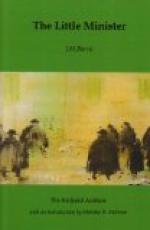“What did she say?”
“Weel, you see, there was a dancing ball on, and Kaytherine Crummie took me to a window whaur I could stand on a flower-pot and watch the critturs whirling round in the ball like teetotums. What’s mair, she pointed out the leddyship that’s to be to me, and I just glowered at her, for thinks I, ’Take your fill, Sanders, and whaur there’s lords and leddyships, dinna waste a minute on colonels and honourable misses and sic like dirt.’ Ay, but what wi’ my een blinking at the blaze o’ candles, I lost sicht o’ her till all at aince somebody says at my lug, ’Well, my man, and who is the prettiest lady in the room?’ Mr. Dishart, it was her leddyship. She looked like a star.”
“And what did you do?”
“The first thing I did was to fall aff the flower-pot; but syne I came to, and says I, wi’ a polite smirk, ’I’m thinking your leddyship,’ says I, ‘as you’re the bonniest yourself.’”
“I see you are a cute man, Sanders.’”
“Ay, but that’s no’ a’. She lauched in a pleased way and tapped me wi’ her fan, and says she, ‘Why do you think me the prettiest?’ I dinna deny but what that staggered me, but I thocht a minute, and took a look at the other dancers again, and syne I says, michty sly like, ‘The other leddies,’ I says, ‘has sic sma’ feet.’”
Sanders stopped here and looked doubtingly at Gavin.
“I canna make up my mind,” he said, “whether she liked that, for she rapped my knuckles wi’ her fan fell sair, and aff she gaed. Ay, I consulted Tammas Haggart about it, and he says, ’The flirty crittur,’ he says. What would you say, Mr. Dishart?”
Gavin managed to escape without giving an answer, for here their roads separated. He did not find the Wild Lindsays, however. Children of whim, of prodigious strength while in the open, but destined to wither quickly in the hot air of towns, they had gone from Caddam, leaving nothing of themselves behind but a black mark burned by their fires into the ground. Thus they branded the earth through many counties until some hour when the spirit of wandering again fell on them, and they forsook their hearths with as little compunction as the bird leaves its nest.
Gavin had walked quickly, and he now stood silently in the wood, his hat in his hand. In the moonlight the grass seemed tipped with hoar frost. Most of the beeches were already bare, but the shoots, clustering round them, like children at their mother’s skirts, still retained their leaves red and brown. Among the pines these leaves were as incongruous as a wedding-dress at a funeral. Gavin was standing on grass, but there were patches of heather within sight, and broom, and the leaf of the blaeberry. Where the beeches had drawn up the earth with them as they grew, their roots ran this way and that, slippery to the feet and looking like disinterred bones. A squirrel appeared suddenly on the charred ground, looked doubtfully at Gavin to see if he was growing there, and then glided up a tree, where it sat eyeing him, and forgetting to conceal its shadow. Caddam was very still. At long intervals came from far away the whack of an axe on wood. Gavin was in a world by himself, and this might be someone breaking into it.




